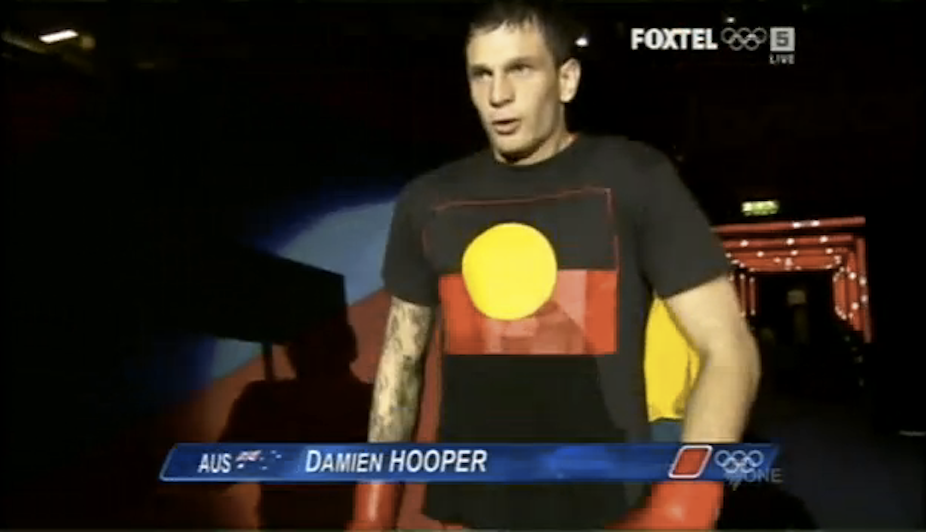There are many people who would like us to believe that sport and politics should never mix. The reason for this is sport is seen as the pure and noble practice where champions arrive after hard work and application and chancers and cheats are found out.
Politics is seen as grubby and cynical, where body blows become part of the national discussion and big decisions come with small movements of the policy makers pen.
But sport and politics have always been entangled. To take one from the other would be like taking a mother out of motherhood. Impossible and implausible.
This is something Indigenous Australian boxer and Olympian Damien Hooper found out when he chose to wear an Indigenous flag t-shirt into the ring.
The Cathy Freeman lesson
Sport enables us to see the over-lapping themes of race and history. When Cathy Freeman cloaked herself in the Aboriginal flag at the 1994 Commonwealth Games it created a furore in the Australian media. Many commentators claimed that Freeman should have refrained, because Aboriginal Australia is not recognised as a self-governing nation.
As historian Colin Tatz put it, “Those who deplored her ‘un-Australian’ behaviour have no understanding of Aboriginal history.”
What he meant is that media commentators failed to acknowledge that no Indigenous Australian has ever formally signed an agreement that they have “given up” their land to anyone.
To put this another way, the [Mabo decision](http://en.wikipedia.org/wiki/Mabo_v_Queensland_(No_2) in 1992 proves that Indigenous peoples and societies were here before 1788. For many non-indigenous Australians this is a concept that they do not or cannot acknowledge and so indifference becomes the way of handling (un)reality.
Football and race
In the late 1980s the West Coast Eagles came into the AFL, along with Indigenous players like Phil Narkle, Wally Matera and Chris Lewis. The “complexion” of the AFL really started to change.
This also brought more supporter hostility with it, culminating in the famous round four fixture between St Kilda and Collingwood in 1993 when Nicky Winmar raised his jumper to a hostile Collingwood football crowd. At the time, Winmar could not have conceived of what the outcome of his action would have been. For the broader community it began the process of sparking great debate about racism in football and society.

Then Collingwood President Allan McAlister said at the time that Winmar and team mate Gilbert McAdam would be respected “as long as they conducted themselves like white people.”
The reason Winmar’s stance has transcended the realm of sport is the power of its message. “You cannot ignore me anymore”, it demands.
Tennis, anyone?
Evonne Goolagong, was perhaps the most internationally famous Indigenous sportsperson in Australia before Cathy Freeman. During the 1980 Wimbeldon tournament, a senior Australian politician at the time said he hoped she “wouldn’t go walkabout like some old boong”.
But she played tennis so well that people forgot her colour. Did this make her any less Indigenous? Of course not, it just added to the rich tapestry of the way we all engaged with and celebrated “our” diversity in sport.
Vox nullius
Which brings us to Indigenous Olmpian Damian Hooper and the issue of his t-shirt. The echoes of Cathy Freeman ghosted his actions. But they also are ghosted by the defiance of Dawn Frazer, Cassius Clay, Tommie Smith and John Carlos.
Why? Because all were fighting to speak out against oppression and a system that does not want to recognise them. In this way it is not just a case of terra nullius in Australia – a legacy we are still dealing with - but also vox nullius – no voice.
Don’t believe me?
If I said I have a world-class athlete who does not drink or smoke, is very religious, has a wife and family and works hard when he is not competing you would possibly reply positively. If I then said “Anthony Mundine”, many opinions would turn negative. I have done this test on many classes of mine and I have asked people why is this the case. The vast majority say because they hate what he says and what he thinks.
Fair enough. I too don’t agree with many things Mundine says but I will defend to the death his right to say it. I ask them about issues of free speech and agency. What they mean for different people and how much they are valued by us all.
The reason why people react negatively because their perspectives also come with a legacy: that being the notion that Indigenous people needing to know their place. To be seen and not heard. To speak when spoken to, to perform when the bell rings or the starters gun goes.
In the land of the fair go and being dinky-di, let us truly embrace what that means. Good luck Damien Hooper and bring back the gold.

